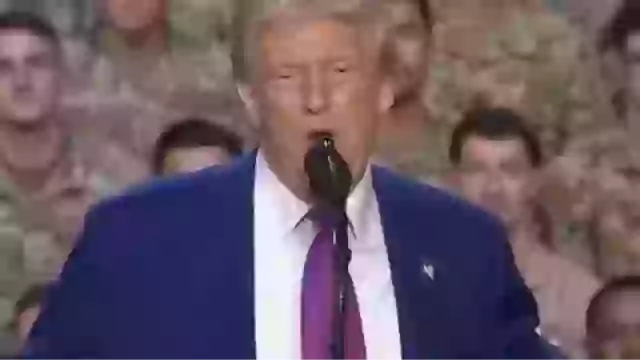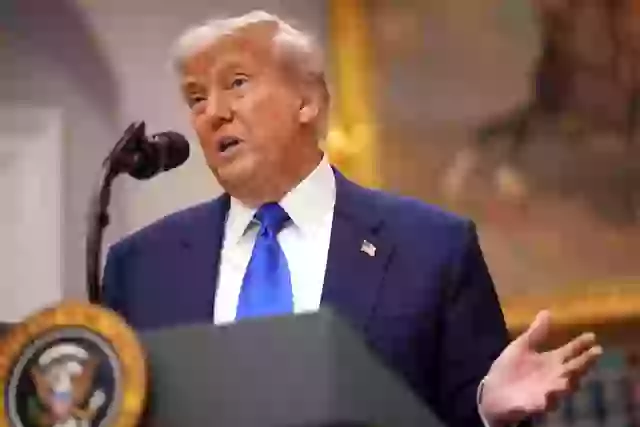Trump’s WWII Remarks Ignite International Tensions and Diplomatic Disdain
In a speech that has shaken diplomatic circles and stunned historians around the world, former President Donald Trump has once again triggered a political firestorm—this time by revisiting the legacy of World War II with a tone and narrative that many view as both inflammatory and revisionist.
Addressing American service members stationed in Qatar, Trump made the audacious claim that had it not been for the United States, large portions of Europe might today be under German—or even Japanese—rule.
What might have passed for typical political bravado instead exploded into global controversy, with critics accusing the former president of historical distortion and willful disregard for the sacrifices of America’s wartime allies.

“They’d All Be Speaking German”—Trump Rewrites WWII History to Elevate American Role
The May 15 address was meant to boost troop morale, but instead, it sent shockwaves through diplomatic and academic communities. In front of an audience of U.S. military personnel, Trump declared that the defeat of the Axis powers in 1945 was due almost exclusively to American might, downplaying the extensive contributions of allied nations such as Britain, France, and the Soviet Union.
“Everyone’s out there waving flags and celebrating,” he said, referencing annual commemorations like Victory in Europe Day. “They’re all patting themselves on the back. But if we didn’t step in, they’d be speaking German—and maybe Japanese too.”
Though Trump’s narrative aligns with his long-held “America First” ideology, the rhetorical flourish was interpreted by many as a deliberate affront to international partners, particularly those who suffered staggering wartime losses in the name of collective victory.
Mockery of Macron and French Resistance Fuels Outrage

Trump didn’t merely emphasize America’s role—he belittled France’s. The former president ridiculed French President Emmanuel Macron and mocked the nation’s wartime legacy with exaggerated accents and dismissive commentary.
“France, we love them, right?” he said, grinning. “But let’s be honest, when Hitler was strolling past the Eiffel Tower, that wasn’t exactly a show of resistance.”
He recounted a supposed conversation with an unnamed European official: “They told me, ‘Donald, we celebrate our victory against the Germans.’ And I said, ‘Are you serious? What victory are you talking about?’”
Such jabs didn’t sit well with European diplomats, many of whom view WWII remembrance as sacred, transcending political boundaries. Trump’s tone, seen by critics as taunting and disrespectful, revived painful memories of occupation and betrayal, while also overshadowing the immense courage displayed by French resistance fighters and citizens alike.
Calls for Commemoration Overhaul: Veterans Day Rebranding Floated
In the same speech, Trump proposed a striking overhaul to America’s historical calendar. He declared May 8—Victory in Europe Day—as a date that should be formally adopted by the U.S. to celebrate Allied triumph in WWII, criticizing the perceived lack of recognition at home.
Moreover, he floated the idea of renaming Veterans Day (November 11) as “Victory Day for World War I,” arguing that the original intent of the holiday had been diluted and should be redirected toward celebrating American military success.
“We won that war too,” Trump said. “So let’s call it what it is. Let’s celebrate victory.”
Historians and veterans’ groups were quick to condemn the suggestion, calling it a politicization of remembrance and a misunderstanding of the broader purpose behind honoring service and sacrifice.
Online Outcry and International Fallout
The backlash was swift and severe. Social media exploded with outrage, with users accusing Trump of both historical ignorance and willful disrespect.
One post that quickly went viral read:
“France helped birth American independence. Now Trump mocks them for not doing enough in WWII?”
Others pointed out the irony of Trump’s celebration of American leadership while alienating the very allies that fought side-by-side with the U.S. on the beaches of Normandy and in the skies over Europe.
Political analysts framed Trump’s rhetoric as a calculated play to reinvigorate nationalist fervor and reassert his vision of American exceptionalism ahead of the 2024 election. However, critics argue that this comes at the cost of diplomatic trust and global unity.
Historical Oversimplification or Political Strategy?
Trump’s comments appear to reflect a broader pattern: recasting historical events through a nationalist lens to rally domestic support. By framing the U.S. as the lone hero in a global war effort, he reinforces a narrative of American indispensability—one that resonates with parts of his base, but alienates longtime allies and international observers.
Scholars warn that this approach distorts complex historical realities. While American involvement was indeed crucial to the Allied victory, it came as part of a massive, multinational effort that spanned continents and claimed millions of lives.
“Reducing WWII to a solo American achievement dishonors the collaborative sacrifice that defined that era,” one Oxford historian commented.
Conclusion: A Controversial Spotlight on History, Diplomacy, and Campaign Rhetoric
Donald Trump’s controversial retelling of WWII and his jabs at European leaders have once again placed him at the epicenter of a global dispute—this time one rooted in history, memory, and diplomacy. By minimizing the roles of other nations and mocking revered allies, he has not only ignited a storm of backlash but also raised serious questions about how historical narratives are weaponized in modern politics.
As the 2024 election draws near, Trump’s blend of revisionist storytelling and provocative nationalism may continue to galvanize his supporters—but at the risk of further straining America’s relationships on the world stage. The legacy of World War II, long a symbol of global unity against tyranny, now finds itself recast in the theater of partisan spectacle—where victory, sacrifice, and truth become battlegrounds in their own right.
